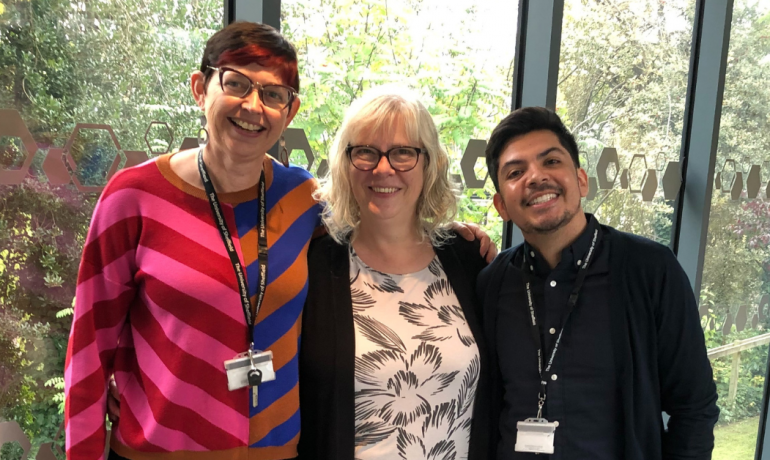A new interview in the EFPA News Magazine informs about the progress of the H-WORK project and provide insights into the role of the different partners of the consortium. EFPA is one of the 14 partners of the H-WORK project. This time, Bruna Zani interviewed three members of USFD team: Karina Nielsen and Carolyn Axtell, both professors of Work Psychology, and Cristian Vasquez, lecturer in leadership.
1. Can you present us your team and the role of the members in the H-Work Project?
The Sheffield team consists of myself, Karina Nielsen and Carolyn Axtell, both professors of Work Psychology and Cristian Vasquez, lecturer in leadership.
2. What is the role of your organization in the H-Work Project?
Our team is responsible for developing the process evaluation of the project. The process evaluation looks at understanding what makes the intervention work, under which circumstances. In other words what works for whom in which circumstances.
3. What has your team accomplished in the project so far (results)?
So far, we have developed the evaluation framework, and we have developed the quantitative survey that explores the context in which the interventions operate and the processes that may facilitate a successful intervention outcome. The survey exists in four versions, each targeting one of the four levels of intervention, individual, group, leader, and organizational level. We have also developed interviews for key stakeholders, line managers and employees to understand more fully how they perceive the interventions and the intervention process. Our partners have used these methods in the first group of organizations that implemented interventions. Our partners are currently using the quantitative measures in the second group of organizations. We have also conducted a meta-process evaluation where we capture the experiences of our partners who are working with organizations to design, implement and evaluate interventions.
We have published the process evaluation framework in a literature review in Work & Stress and outlined the evaluation process in a paper in the International Journal of Environmental Research and Public Health. We have run several workshops on how to do process evaluation and how to write process evaluation papers.
4. What are you currently working on and what are the next steps?
Currently, we are working on the validation of the survey data. We are also working on developing the process evaluation toolkit that will be made available for all on the H-Work platform. We continue to support the implementation of the process evaluation measures in the second group of organizations and we support partners in developing and writing process evaluation papers.
5. What are your expectations regarding the outcomes of the project, after 2 and a half years of work? There has been a change re the initial expectations?
The pandemic obviously had a huge effect on the project, but we managed nevertheless to implement and evaluate multi-level interventions in all our participating organizations. We do fear that the pandemic has hampered the quality of the data.
6. What are currently the main obstacles for your work in general and in the project?
The main obstacle to the project has been the pandemic, which has caused delays in the work with organizations. As the Sheffield team has not been in direct contact with organizations, we have faced fewer challenges than our partners.
7. What has been (and still is) the impact of COVID on the work of your organization for the project?
We have had to make some adjustments to our methods to try to capture how the pandemic has influenced how organizations have worked with implementing multi-level interventions.
8. What is the biggest strength of your organization in advancing the project?
The greatest strength of our organization is that we have 20 years of experience in designing, implementing, and evaluating workplace interventions and can provide practical guidance on how to do this. We also have experience publishing complex research in high impact journals.
9. How do you think your organization and EFPA can collaborate?
I think we can benefit each other as EFPA can help get our findings and tools out to a broad range of people. We on the other hand can help develop materials that are easily understood, facilitating the translation of research to practice.


